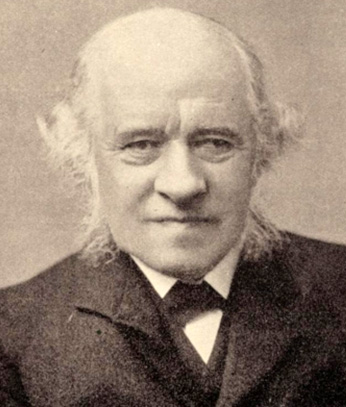
George Grove
Sir George Grove CB (13 August 1820 – 28 May 1900) was an English engineer and writer on music, known as the founding editor of Grove's Dictionary of Music and Musicians.
Grove was trained as a civil engineer, and successful in that profession, but his love of music drew him into musical administration. When responsible for the regular orchestral concerts at the Crystal Palace, he wrote a series of programme notes from which eventually grew his musical dictionary. His interest in the music of Franz Schubert, which was neglected in England at that point in the nineteenth century, led him and his friend Arthur Sullivan to go to Vienna in search of undiscovered Schubert manuscripts. Their researches led to their discovery of the lost score of Schubert's Rosamunde music, several of his symphonies and other music in 1867, leading to a revival of interest in Schubert's work.
Grove was the first director of the Royal College of Music, from its foundation in 1883 until his retirement in 1894. He recruited leading musicians including Hubert Parry and Charles Villiers Stanford as members of the College faculty and established a close working relationship with London's older conservatoire, the Royal Academy of Music.
In addition to his musical work, Grove had a deep and scholarly knowledge of the Bible. He contributed to the English literature on the subject, including a concordance in 1854 and about a thousand pages of Sir William Smith's 1863 Bible Dictionary. He was a co-founder of the Palestine Exploration Fund.
Biography[edit]
Early years[edit]
Grove was born in Clapham, the eighth of the eleven children of Thomas Grove (1774–1852), fishmonger and venison dealer, and his wife, Mary (née Blades; 1784–1856).[1] A younger sister, Eleanor, was the founding principal of College Hall, London.[2]
He went to a preparatory school, on Clapham Common, where one of his schoolfellows was George Granville Bradley, later Dean of Westminster, whose sister Grove subsequently married.[3] He next entered Stockwell (later known as Clapham) Grammar School, run by Charles Pritchard, the astronomer, who was inspired by the progressive principles of King's College, London. The educational curriculum was based on classics, divinity, mathematics and natural philosophy, and rigorously tested by annual examination. Pritchard also encouraged his pupils to develop interests in literature and music.[4]
Grove was a regular worshipper at Holy Trinity, Clapham, where he listened to the music of Bach and Handel. By the age of sixteen, he was competent in classics and mathematics; he left the school in 1836 and was apprenticed to Alexander Gordon, a well-known civil engineer in Westminster. In his free time, he immersed himself in music, attending concerts and studying scores.[1]
After completing his apprenticeship, Grove was admitted as a graduate of the Institution of Civil Engineers, in 1839. A year later he went to Glasgow, gaining further experience in the factory of Robert Napier.[3] In 1841, Grove had an affair with a woman called Elizabeth Blackwell, who gave birth to his illegitimate son, George Grove Blackwell, in March 1842. Between 1841 and 1846, Grove spent most of his time in the West Indies, as resident engineer during the building of cast-iron lighthouses.[4]
After this he joined the staff of the Chester and Holyhead Railway and then became assistant to Edwin Clark, working on the Britannia Bridge across the Menai Strait. An account of the first floating of the tubes of the bridge is recorded in The Spectator of 23 June 1849, which was Grove's first appearance in print.[5] During this period, he lived in Chester, hearing music in the cathedral and also becoming familiar with Welsh folksong.[4]
Music and biblical scholarship[edit]
While working on the Britannia Bridge Grove came into contact with Robert Stephenson, Isambard Kingdom Brunel, Sir Charles Barry and other eminent visitors to the works. "These distinguished men", Grove later recalled, "noticed me and were as good as gold to me. They counselled me to go to London and forced me into the secretaryship of the Society of Arts, then vacant by the retirement of Mr. Scott Russell."[6] This was in 1849, when the Great Exhibition of 1851 was in preparation. Grove was the society's secretary for the duration of the exhibition.
On 23 December 1851, he married Harriet Bradley, the sister of his old school friend George Bradley. After the Great Exhibition closed in 1852, its principal building, known as "the Crystal Palace", was dismantled and rebuilt in the south London suburb of Sydenham as a centre for education, the arts and leisure. Grove was appointed secretary of the Crystal Palace. He engaged a wind band and a conductor, Heinrich Schallehn. The latter was found to be unsatisfactory, and was replaced by August Manns, who, with Grove's encouragement, developed the band into a full-sized symphony orchestra. With programmes chosen by Grove and Manns, the Crystal Palace concerts became a central feature of London's musical scene and remained so until the end of the century.[1]
Grove wrote the programme notes for the concerts. In 1901, a biographer wrote: